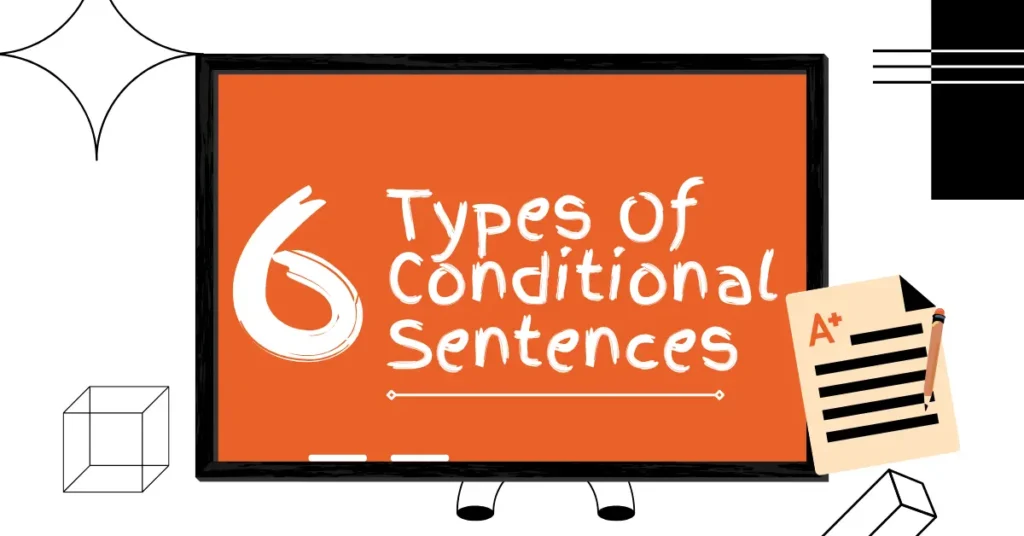Types of Conditional Sentences: Conditional statements are an important part of English. They help us talk about things that might happen, things we imagine, or things that depend on a condition. For example, we say, “If it rains, I’ll take my umbrella,” or “If I had studied, I would have passed the test.” These sentences show how one thing can lead to another.
Learning conditional statements is very useful. You can use them to talk about the future, make plans, or explain past events. There are different types of conditional statements, and each one has a special purpose. Some talk about facts, some about possibilities, and others about things that did not happen.
Types of Conditional Sentences in English

In this lesson, we will explain the five main types of conditional statements: zero, first, second, third, and mixed. We will also give you examples to help you understand them. By the end of this lesson, you will know how to use these statements to make your English better. Let’s start learning about conditional statements!
1. Zero Conditional
The zero conditional is used to talk about general truths or facts that are always true under certain conditions. Both the if-clause and the main clause use the present simple tense.
Structure:
If + Present Simple, Present Simple
Examples:
- If you heat water to 100°C, it boils.
- If it rains, the ground gets wet.
2. First Conditional
The first conditional is used for real or possible situations in the future. It describes something that is likely to happen if the condition is met.
Structure:
If + Present Simple, Will + Base Verb
Examples:
- If I study hard, I will pass the exam.
- If it stops raining, we’ll go for a walk.
3. Second Conditional
The second conditional is used for unreal or hypothetical situations in the present or future. It describes something that is unlikely to happen or purely imaginary.
Structure:
If + Past Simple, Would + Base Verb
Examples:
- If I were a millionaire, I would travel the world.
- If she knew the answer, she would tell you.
Note: “Were” is commonly used instead of “was” with “I/he/she/it” in formal English (e.g., If I were you…).
4. Third Conditional
The third conditional is used to talk about past situations that didn’t happen. It expresses regret or imagined outcomes if something in the past had been different.
Structure:
If + Past Perfect, Would Have + Past Participle
Examples:
- If I had studied harder, I would have passed the exam.
- If we had left earlier, we wouldn’t have missed the train.
5. Mixed Conditional
Mixed conditionals combine two different time frames, such as a past action and a present result, or a present situation and a past result.
Mixed Conditional 1: Past Condition → Present Result
Structure:
If + Past Perfect, Would + Base Verb
Examples:
- If I had taken that job, I would be happier now.
- If she had saved more money, she wouldn’t be struggling now.
Mixed Conditional 2: Present Condition → Past Result
Structure:
If + Past Simple, Would Have + Past Participle
Examples:
- If I were taller, I would have joined the basketball team.
- If she spoke Spanish, she would have gotten the job.
6. Other Conditional Expressions
In addition to these main types, there are other ways to express conditions using phrases such as “as long as,” “provided that,” “in case,” “supposing,” etc. These are often used interchangeably in both real and hypothetical scenarios.
Examples:
- As long as you work hard, you’ll succeed.
- Provided that it doesn’t rain, we’ll have a picnic.
- In case you get lost, here’s my phone number.
Understanding and practicing these conditional statements will help you talk about possibilities, imaginations, and results more fluently in English! Let me know if you’d like exercises for each type.
[types of Conditional Sentences]
Learn More:
12 Common Conditional Expressions: Learn, Practice, and Master